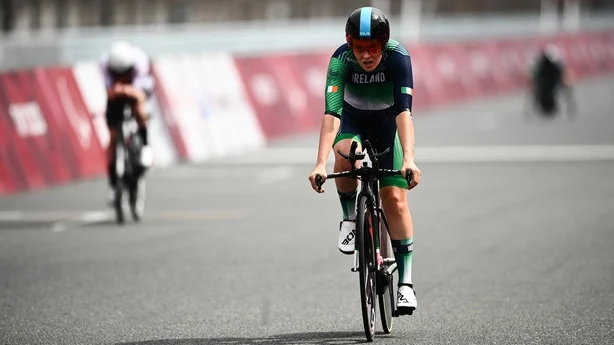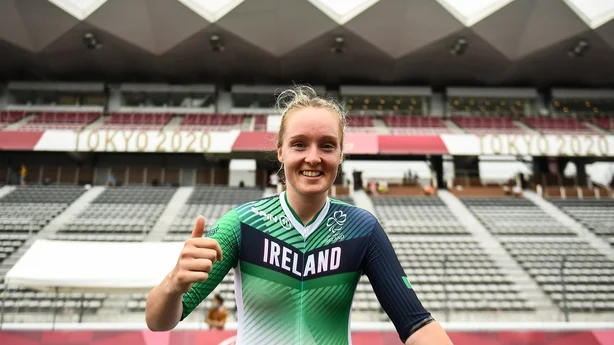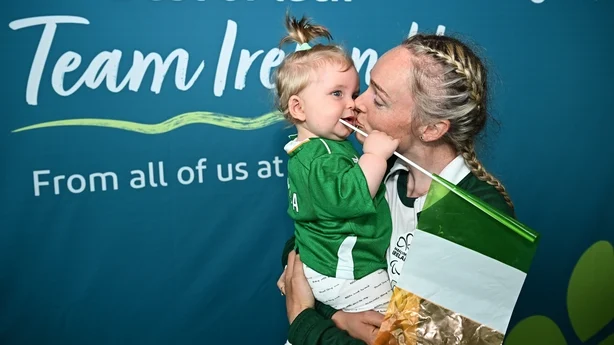"This year was probably [harder] in terms of stress and that, that you're training for Paris, but you're actually not even sure if you're going to be there. It was different in that sense."

She heads to Paris with a busy schedule on the bike. Her first two outings are in the velodrome – the 3000m individual pursuit and 500m time trial – followed by two days on the road in the time trial and road race.
Timothy competes in the C3 category, meaning she competes on a solo bike.
Unlike the World Championships however, athletes in C1 and C2 categories - the lower the number, the more severe the impairment – are all competing in the same events.
For example, in the short sprint event, a C1 or C2 athlete would get a percentage of their time taken off because they have a higher level of disability.
It makes competing in the time trial and 500m an uphill challenge, but it could prove to be an advantage for her two main events, the pursuit (Day 1) and road race (Day 10).
"People would look at previous results and say, 'Oh, she got a medal there,' but then they're combining categories, so it makes it a little bit more confusing," she says. "And more difficult to explain."
Having grown up on the Roscommon side of the Galway half-parish of Ballymoe, Timothy was an accomplished sporting all-rounder.
She played underage football for Ireland alongside current captain Katie McCabe, and enjoyed a lengthy career up to under-21 level with Roscommon, before her world was turned upside down by an acquired brain injury.
Timothy felt the initial swelling of the brain would mean a short-term absence, but gradually the situation began to dawn on her. With just 30% function on her right side, field spots would have to be consigned to the past.

The world of para-cycling opened up to her and speaking before the Tokyo Games, Timothy insisted that the sport had saved her life.
The passion for her sport still burns brightly, but the perspective has changed.
"I still love competing and I still love riding my bike," she said. "And I think the most important thing is I want to keep showing that, even a brain injury doesn't stop you doing sport.
"To be a cyclist, because it's so solo, if you're not enjoying it and wanting to do it, you're not going to perform.
"Previously, I looked at it as, it's great to be cycling, but now it's a job. You're doing it for your family, for everyone else. I still love it.
"My reasoning for it is not because of medals and because of show and all that, it's still just to show people that have a disability or have acquired something that they thought would change their lives, that there is this option."
The presence of baby Lucy has changed the landscape dramatically.
Having gone through IVF with her partner Jenny who gave birth, it was all planned with her off-season in mind.
They have worked out their own routine, Timothy able to fully commit to her training camps and the weekly trip to Dublin where she covers off S&C, sports psychology and a meeting with the nutritionist if required.
"Jenny understands the level you have to be at to compete. I need my sleep so that I can perform at the best, and everyone's all in on that for this year, which is the way it has to be, but it's hard, because if I'm going out for four hours and Lucy has been awake all night, you're feeling bad, but at the same time I'm doing it to get an income.

"That's my job at the end of the day. I have a brain injury, so fatigue was a huge issue. So not sleeping and fatigue, it was impacting me negatively with training so I just had to adapt a few things."
Currently she’s in a two-week camp in Portugal, getting that final blast of preparation in before departing for Paris.
"I say it's like going on a military camp, because you're living in the velodrome, sleeping at the velodrome. You basically just get up, eat, train, go to sleep and repeat again."
One of the key lessons learned from Tokyo was knowing her limits. The brain injury means fatigue sets in when concentration is required. The driving to Dublin takes its toll, never mind the energy-sapping environment of the Paralympic village and time between events.
In an almost overwhelming situation, she could hardly be honest with herself, never mind others, that rest was essential.
"I was new, I just wanted to do everything I was given. Now if I get to one o'clock in the day and I'm wrecked, I know I need to get an hour's sleep, and if I don't, tomorrow and the next day, I mightn't be able to do anything.
"We do this new thing, a scale of one to 10 of brain injury fatigue, how are you feeling that day?
"If you're past a six or a seven, then you might need to cut back on training, or sleep and do the training later in the day, whereas if you're a zero, you're free to fly on and keep going. It's different but that's para sport."
Timothy’s upbringing was full of sporting endeavour, the ideal learning environment to experience that life, like sport, is a seesaw of highs and lows.
Slipping into the world of disability has allowed her the chance to appreciate how invaluable her formative years were, especially when she coaches kids with disabilities, something she will explore further when the cycling career is over.
Kids with a disability, you need to throw them in and then if they can't do it, adapt it, as opposed to tell them they can't do it before they try at all.
She feels passionately that it’s crucial that adults do their bit to help children with disabilities to find their niche.
"I've gone to a lot of schools, and instead of letting the kid with a disability partake, they're fearing that he or she will get hurt, so it's better for them not to do it," she says.
"Growing up, in sport or whatever I did, my parents always said, 'You're going to try it, and then you can tell me you don't want to do it.'
"Especially kids with a disability, you need to throw them in and then if they can't do it, adapt it, as opposed to tell them they can't do it before they try at all.
"I'm trying to say to them, 'Try not to be told 'no'. Just try it and then say, 'Actually, yeah, I couldn't do it. I'll do something different'."
The 2024 Paris Paralympics run from 28 August to 8 September.
Disclaimer: The copyright of this article belongs to the original author. Reposting this article is solely for the purpose of information dissemination and does not constitute any investment advice. If there is any infringement, please contact us immediately. We will make corrections or deletions as necessary. Thank you.






